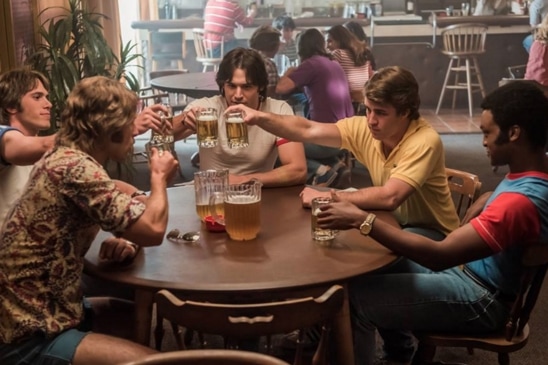The only forward momentum, aside from the languid passage of time, is the ticking clock towards the official beginning of school, and even that proves to be a mostly artificial horizon. Everybody Wants Some is solely about creating a feeling of youthful independence, when future responsibilities are impossibly far away and the only thing of interest is what are we doing tonight. For those privileged and fortunate enough to have spent any period of time in such a frivolous bubble, Everybody Wants Some is a delicious taste of nostalgia. While the culture has lazily been captured by the 'Member Berries of Star Wars sequels and Stranger Things, Linklater is working on a more intimate level in his conjuring of days past. Meaningless totems of earlier times are cast aside in favor of what it actually felt like to be young and surrounded by your best friends, exchanging marketing forces for something far more potent. Hearing a song from the time period is just the starting point: Linklater goes further by having people take part in the song, including the guy with the finely tuned facial reactions to the lyrics and the other guy who shockingly knows all the words.
Linklater is able to thread the needle between universality and specificity with expertise. So many incidents and personalities are instantly recognizable, especially to young men, likely because Linklater might have had many of these experiences himself. He also played college baseball in Texas, so when an elaborate prank is played on a late arrival to the locker room, I would be unsurprised if Linklater was on the planning or receiving end of it, or both. The mechanics of that prank, while funny in its execution and its anticipation, are only one part of the equation. The potential for overreaction, the improvisation when it starts coming together, and the willingness of the prankee to immediately try it out on the next guy all combine to find the behavioral truth of these kind of monkeyshines, no matter what the prank itself is. Everybody Wants Some is also able to create so many well-rounded archetypes of dude culture that the viewer is going to be reminded of someone they know at some point. It's almost certain that, if watching with a buddy, a character will come onscreen and the two viewers will look at each other and say the name of the person the character reminds them of, in unison.
That Linklater is able to have such a large cast without making any of the characters feel like stock tropes is incredible. Even the more grating individuals are given redemptive outs to their previously unbearable behavior. Jenner is a pleasantly affable center to the film, present in nearly all scenes, and he's surrounded by characters that he easily bounces off of. While no one feels shortchanged, some do rise above. Tyler Hoechlin gives an excellent physical performance, wholly credible as a professional prospect and as the respected team captain. Glen Powell ably fills the Linklater-requirement of a verbose type, blessed with bottomless charisma and the gift of gab. Tanner Kalina steals scene after scene as the aptly named Brumley, another freshman with a goofy earnestness that never fails to generate laughs. Outside of the baseball team, a high school friend of Jake's, having left baseball behind for a full embrace of the punk scene, is a joyful example of how fluid collegiate identities can be, and Michael Monsour plays him with unrepressed joy. Lastly, while no one would call this film a showcase for ladies, there is fine work being done by Zoey Deutch as an intriguing love interest for Jake, and as expected, Linklater gives her far more to do than just standing around, looking coy.
Will Ferrell, in discussing his college fraternity experience, described it as somewhat of a mistake. In his mind, college is for finding out who oneself really is, and dropping into a group mentality isn't the best way to achieve that. The baseball team of Everybody Wants Some is deeply similar to a fraternity, but Linklater has taken Ferrell's proscription to heart. While it certainly wouldn't be the worst thing to carouse with these guys for four years, the film also understands, and shows Jake understanding, how constricting that could be. While there's minimal conflict to be had here, there is Linklater's oft-used tool of using a small window to delineate a broader, unseen, future arc. There's a sense of what happened to the characters at the end of Dazed and Confused, and there's that same sense here. The viewer leaves wanting Jake to find the Golden Mean, to be a full individual within a group, not necessarily because he's so indelible a character, but because this might be a perfect place for such exploration. At one point, Hoechlin's character wistfully remarks that today is the best day of his life, at least until tomorrow. Everybody Wants Some is able to recreate that feeling for anyone who's had that kind of youthful, absurd optimism. It's not Linklater's most affecting film, but it might be his most fun. A

 RSS Feed
RSS Feed